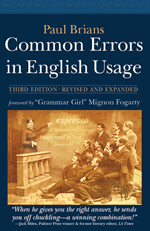Other Commonly Misspelled Words
Here is a list of some of the most commonly misspelled words in English which I consider not interesting enough to write up as separate entries. These are the correct spellings. Reading over the list probably won’t improve your spelling much, but choosing a few which you find troublesome to write out correctly a few times may.
absence, abundance, accessible, accidentally, acclaim, accommodate, accomplish, accordion, accumulate, achievement, acquaintance, across, address, advertisement, aggravate, alleged, annual, apparent, appearance, argument, atheist, athletics, attendance, auxiliary, badminton, balloon, barbecue, barbiturate, bargain, basically, beggar, beginning, believe, biscuit, bouillon, boundary, Britain, Buddha, business, calendar, camouflage, cantaloupe, category, cemetery, chagrined, challenge, characteristic, changing, chief, cigarette, climbed, collectible, colonel, colossal, column, coming, committee, commitment, comparative, competent, completely, concede, conceive, condemn, condescend, conscientious, consciousness, consistent, continuous, controlled, convenient, coolly, corollary, correlate, correspondence, counselor, courteous, courtesy, criticize, deceive, defendant, deferred, dependent, descend, description, desirable, despair, desperate, develop, development, difference, dilemma, dining, disappearance, disappoint, disastrous, discipline, disease, dispensable, dissatisfied, doesn’t, dominant, drunkenness, easily, ecstasy, efficiency, eighth, either, eligible, emperor, enemy, entirely, equipped, equivalent, especially, exaggerate, exceed, excellence, excellent, exhaust, existence, expense, experience, experiment, explanation, extremely, exuberance, fallacious, fallacy, familiar, fascinate, feasible, fictitious, finally, financially, fluorescent, forcibly, foreign, forfeit, formerly, foresee, forty, fourth, fulfill, fundamentally, gauge, generally, genius, government, governor, grievous, guarantee, guerrilla, guidance, guttural, handkerchief, happily, harass, height, heinous, hemorrhage, heroes, hesitancy, hindrance, hoarse, hoping, humorous, hypocrisy, hypocrite, ideally, idiosyncrasy, ignorance, imaginary, immediately, implement, incidentally, incredible, independence, independent, indicted, indispensable, inevitable, influential, information, inoculate, insurance, intelligence, intercede, interference, interrupt, introduce, irrelevant, irresistible, island, jealousy, judicial, knowledge, laboratory, legitimate, leisure, length, lenient, liaison, lieutenant, likelihood, likely, longitude, loneliness, losing, lovely, luxury, magazine, maintain, maintenance, manageable, maneuver, marriage, mathematics, medicine, millennium, millionaire, miniature, minuscule, minutes, mischievous, missile, mortgage, mosquito, mosquitoes, murmur, muscle, mysterious, narrative, naturally, necessary, necessity, neighbor, neutron, ninety, ninth, noticeable, nowadays, nuisance, obedience, obstacle, obstinate, occasion, occasionally, occurred, occurrence, official, omission, omit, omitted, opinion, opponent, opportunity, oppression, optimism, ordinarily, origin, original, outrageous, overrun, panicky, parallel, parliament, particularly, pavilion, peaceable, peculiar, penetrate, perceive, performance, permanent, permissible, permitted, perseverance, persistence, physical, physician, picnicking, piece, pilgrimage, pitiful, planning, pleasant, portray, possess, possessive, potato, potatoes, practically, prairie, preference, preferred, prejudice, preparation, prescription, prevalent, primitive, privilege, probably, procedure, proceed, professor, prominent, pronounce, pronunciation, propaganda, psychology, publicly, pursue, quandary, quarantine, questionnaire, quizzes, realistically, realize, really, recede, receipt, receive, recognize, recommend, reference, referred, relevant, relieving, religious, remembrance, reminiscence, renege, repetition, representative, resemblance, reservoir, resistance, restaurant, rheumatism, rhythm, rhythmical, roommate, sacrilegious, sacrifice, safety, salary, satellite, scary, scenery, schedule, secede, secretary, seize, sentence, separate, sergeant, several, shepherd, shining, similar, simile, simply, sincerely, skiing, solely, soliloquy, sophomore, souvenir, specifically, specimen, sponsor, spontaneous, statistics, stopped, strategy, strength, strenuous, stubbornness, subordinate, subtle, succeed, success, succession, Sudoku, sufficient, supersede, suppress, surprise, surround, susceptible, suspicious, syllable, symmetrical, synonymous, tangible, technical, technique, temperature, tendency, themselves, theories, therefore, thorough, though, through, till, tomorrow, tournament, tourniquet, transferred, truly, twelfth, tyranny, unanimous, undoubtedly, unnecessary, until, usage, usually, vacuum, valuable, vengeance, vigilant, village, villain, violence, visible, warrant, Wednesday, weird, wherever, wholly, yacht, yield, zoology

